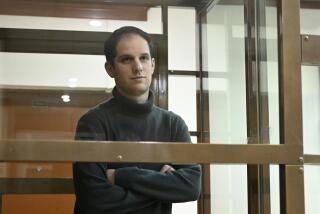Hope on Deadlock Seen by Gorbachev : Ready to Plan for a Summit, Soviets Indicate
- Share via
MOSCOW — Deputy Foreign Minister Vladimir F. Petrovsky, apparently signaling that a second Reagan-Gorbachev summit is back on track, said Tuesday that the Soviet Union has proposed that both sides get ready for a preparatory meeting between Foreign Minister Eduard A. Shevardnadze and Secretary of State George P. Shultz.
Petrovsky’s statement at a news conference represented a sharp change from negative and equivocal attitudes expressed by Moscow regarding another meeting between Soviet leader Mikhail S. Gorbachev and President Reagan.
In Washington, new Soviet Ambassador Yuri V. Dubinin said “we’re optimistic” about a Reagan-Gorbachev summit. Asked by reporters about the possibility of a Shultz-Shevardnadze planning session, he replied: “We’re talking about it. I don’t know, but I hope.”
Ready for Meeting
The White House and the State Department said the United States is ready for a Shultz-Shevardnadze meeting and called on the Soviets to set a date. Shultz had complained Saturday that Moscow has been dragging its feet by refusing to agree to a date for the long-proposed meeting of the foreign ministers.
White House spokesman Larry Speakes welcomed Petrovsky’s statement. Speakes said he hopes that it indicates “a willingness on (the part of) the Soviet Union to move forward to preparations for a summit, which we would like to have.”
After the United States sent warplanes to bomb Libya on April 15, the Soviet Union canceled a scheduled May 14 planning session between Shultz and Shevardnadze in Washington.
Later, Reagan’s announcement that the United States will not continue to observe the terms of the unratified, second strategic arms limitation agreement gave rise to sharp denunciations from Moscow and more rhetoric about the damage done to prospects for a second summit.
No Interference Allowed
But Petrovsky’s comment seems to indicate that the Soviet Union is not going to let the attack on Libya, renewed U.S. backing for guerrillas fighting Soviet troops in Afghanistan or the SALT II decision interfere with the top-level talks.
In discussing the proposal for a pre-summit session of foreign ministers, Petrovsky said, “We have proposed to the United States to set in motion the preparatory mechanisms for such a meeting between our two ministers.”
However, State Department spokesman Charles Redman questioned whether Petrovsky’s statements should be taken at face value because he conveyed a different message from what Moscow has sent through normal diplomatic channels.
“Diplomatic channels exist,” Redman said. “Both sides know how to use them.”
As usual, the Soviet diplomat emphasized that a second summit must produce concrete results in the form of arms control agreements or it would make no sense to hold it.
‘Not Just a Handshake’
“We are for a summit meeting with the United States, but we would like the meeting not to be just a handshake but to be followed by tangible, concrete results with regard to greater security and the limitation of arms,” Petrovsky said.
The first Reagan-Gorbachev summit was held last November in Geneva.
Shultz and Shevardnadze are expected to meet in September, when they are scheduled to be in New York for the opening of the U.N. General Assembly. But Shultz had hoped to meet earlier to start preparations for the summit.
A senior Western diplomat in Moscow said the summit could be held in late November or early December, barring any unexpected developments.
Attack Dashed Hopes
The attack on Libya dashed hopes for a summer summit. The United States opposed holding a meeting in September or October, when congressional election campaigns are under way, but Reagan has said a December session would be acceptable.
There was a warm glow in Soviet-American relations following the first Reagan-Gorbachev meeting last November, but it seemed to flicker out a few months later.
At that meeting, the two leaders agreed to meet again this year in the United States, but the Kremlin hesitated in setting a date. The Soviets indicating that they did not want a second summit until there was some prospect of reaching definite agreements, primarily on arms control, at such a meeting.
Times staff writer Norman Kempster, in Washington, contributed to this article.
More to Read
Sign up for Essential California
The most important California stories and recommendations in your inbox every morning.
You may occasionally receive promotional content from the Los Angeles Times.













